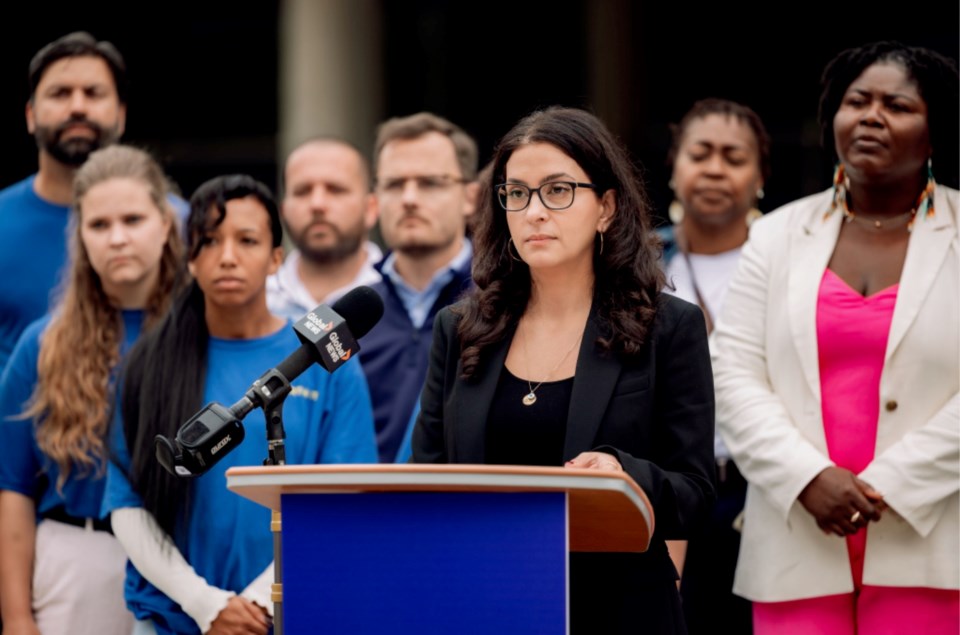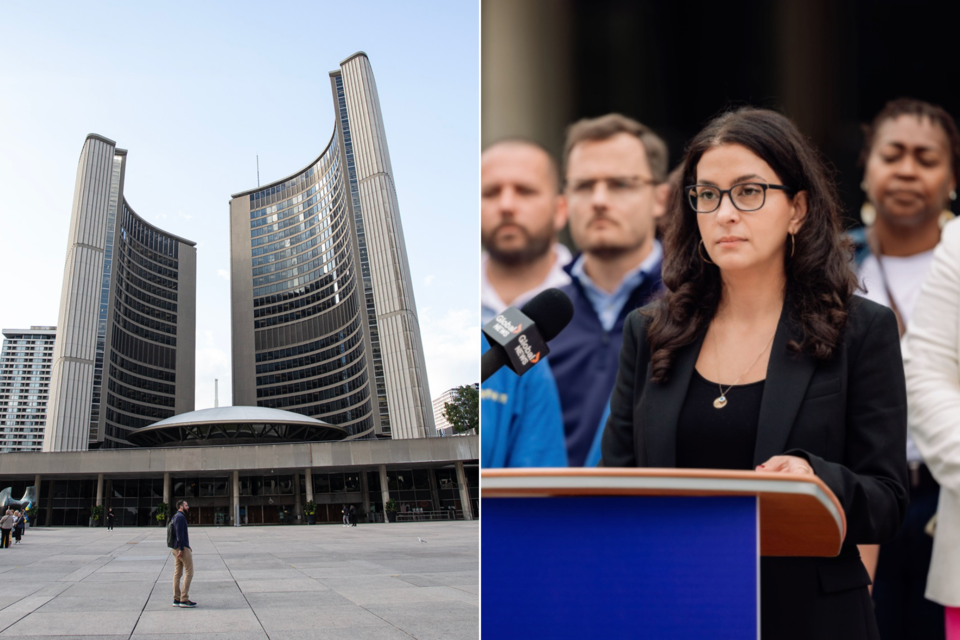The Canadian Union of Public Employees Local 79 (CUPE79) is alleging the City of Toronto employed former police officers to investigate city workers, and that these ex-cops subjected employees to aggressive “police-style interrogations” while probing workplace misconduct.
The union, which represents about 30,000 City of Toronto workers, claimed some city employees were pulled into hours-long interviews as part of workplace investigations. During these interviews, city investigators allegedly raised their voices, tossed papers and badgered employees with the same questions repeatedly.
Law enforcement experts told TorontoToday these tactics are consistent with the “Reid” technique of police interrogation which emphasizes a guilt-presumptive line of questioning. This style of interrogation was phased out by the Royal Canadian Mounted Police (RCMP) amid criticism that the method can induce false confessions.
The City of Toronto has denied allegations that aggressive interrogations took place and described the claims as “patently untrue.”
CUPE79 President Nas Yadollahi said there are a number of workplace investigators at the City of Toronto who have “hefty police experience.” She said the union is in talks with the city about bringing in lawyers to sit with workers during interviews because of the union’s concerns.
At least one former contractor who worked for the City of Toronto as an internal investigator is a former Toronto Police Service detective, TorontoToday found. The city acknowledged it hires investigators with law enforcement experience.
TorontoToday spoke to two CUPE79 officers who sat in during these alleged interrogations. They said they witnessed aggressive and condescending behaviour that runs counter to the City of Toronto’s commitment to using “trauma-informed approaches” in its workplace investigations.
The allegations
One of the CUPE79 officers, who asked to remain anonymous, said one of these interrogations took place in November 2022. The anonymous officer accompanied the city worker to the interview to provide support and union representation.
Three investigators were in the room to interview one city employee, they said. What was supposed to be a “fact-finding” meeting to lay out the circumstances of the case turned into something out of a cop show, the anonymous officer added.
At one point in the interview, the lead investigator “was standing over [the employee], asking the same question over and over in an aggressive manner and pointing at papers and really making the [employee] feel very uncomfortable,” the officer said. “It’s like he did some heinous crime.”
The officer did not share what the employee was being investigated for, but emphasized that workplace investigators should be working from a presumption of innocence until proven guilty.
Investigators allegedly raised their voices and were “abrasive and disrespectful,” the union officer claimed. The tone of the meeting grew progressively more intense and the union officer said they had to step in.
“At one point I had to stop them and say, ‘You know what, I’m not comfortable with this; with your tone. You’re being very aggressive,’” the officer recounted.
The interview lasted for several hours and left the worker feeling scared and intimidated, the officer said.
“They'll keep you in the room for hours and hours and kind of wear you down until you want to give them whatever answer [they’re looking for] so you can just get out of there,” the officer said.
The employee is a racialized person and the investigators were not, which the officer said contributed to the intimidating atmosphere in the interview. Towards the end of the interrogation, the employee could hardly speak because he was so frightened, the officer said.
“When someone’s in your face like that and hovering over you, especially if you’re a racialized worker and you’ve encountered bullying or racist sentiment against you, it’s traumatic,” the officer said.
The investigators became particularly frustrated when the worker didn’t give them the answers they were looking for, the officer said.
“It's almost like they're leading,” the anonymous officer noted. “They've decided that this person is guilty and they're going to get it out of them.”
Another CUPE79 officer, Jason Desjardin, said he sat in during an aggressive workplace interview in October 2023. He said right off the bat, the workplace investigator identified herself as a former Toronto police officer.
The employee in this case was being investigated for fraudulent use of sick days. Desjardin said she was subjected to badgering and disrespectful conduct that ended up bringing her to tears.
When the workplace investigator showed the employee a piece of evidence she “tossed it across the table at her,” Desjardin said.
“I said, ‘Hey, don’t do that, that’s not appropriate.’ And she said, ‘Oh sorry, that’s run over from my days as a police officer,’” he alleged.
After Desjardin asked the investigator to stop tossing papers, she did it two to three more times, he claimed.
The investigator “continued to badger the [employee], and it got really rough,” Desjardin said. “When I say badgering I mean asking the same question two or three times … and not even saying it differently.”
Desjardin said the employee was answering all the investigators' questions but the investigator nevertheless repeated the same queries over and over.
“They’re just very pushy and condescending,” he said, adding it appeared the investigators had already decided the employee was guilty prior to questioning.
The interview allegedly ended with the worker crying and needing to take a two-hour breather outside before she felt she could drive home.
“She was very distraught, very upset,” Desjardin said.
CUPE79 President Yadollahi claimed this aggressive and leading-style of interview is a regular issue with city investigators, especially within the city’s Internal Investigations Unit (IIU).
“This is a consistent approach that the city takes. We constantly have to call them out and say, ‘This is a predetermined outcome that you're looking for, stop with the leading questions,’” she said.

The City of Toronto’s response
Sean Milloy, the executive director of employee relations at the City of Toronto, blasted the allegations as false and said CUPE79 has already raised this issue with an independent arbitrator.
“The union has previously made similar allegations in the context of a grievance about the operation of the IIU, which was dropped two days into a hearing before an independent arbitrator,” Milloy told TorontoToday. “The City reviewed those complaints at the time and determined them to be without merit.”
Milloy added the IIU “conducts its investigations in a fair, timely, impartial and consistent manner” and staff “use standard interview techniques and trauma-informed approaches.”
The IIU’s staff come from a variety of backgrounds, Milloy said, including “human resources, labour relations, inspections and law enforcement.”
Yadollahi told TorontoToday Milloy was being “misleading” when he said the union’s grievance was dropped in a hearing before an independent arbitrator. She claimed the City was “making it impossible to have a productive discussion” during the hearing, and so the union paused proceedings, not dropped them.
“The core issue in this case was our demand to reserve the right to provide legal representation for workers when the City brings in former police interrogators to investigate our members. The City has insisted that legal representation cannot be used, despite our collective agreement allowing the union to send a 'designate,' which could include a lawyer,” Yadollahi wrote in a statement.
“This insistence suggests the City is employing practices that would be challenged by a lawyer, and this is why the City would instead prefer to be faced with less experienced union stewards to respond to police-style interrogations and intimidation tactics against our members.”
TorontoToday learned the name of one former Toronto police detective who was hired as an external contractor to conduct workplace investigations within the City of Toronto. The city did not comment on this specific person’s hiring, but noted the city occasionally hires external investigators.
“Like many other employers, the City will from time-to-time hire external investigators to conduct or support investigations due to the workload of in-house investigators,” Milloy said. “Investigators hired as external contractors are required to meet the same standards of professionalism and follow the same interview practices as IIU employees.”
Milloy’s statements come at a time when the city’s internal Human Rights Office (HRO), which addresses and investigates human rights and harassment complaints in the workplace, has been struggling to keep up with demand for its services.
In 2022 and 2023, the HRO wasn’t able to lead any new investigations into workplace complaints due to “decreased capacity” and “the concurrent increase in inquiries,” chief people officer Mary Madigan-Lee wrote in a report.
When the HRO is unable to probe alleged misconduct, cases can be brought to “inexperienced and overburdened management” or “human resources professionals who may not have the requisite expertise,” Madigan-Lee warned. This can result in errors, which could open the city up to legal liability, she said.
Bringing in external investigators to manage the workload also presents challenges.
“External investigations involve retaining independent consultants who may lack familiarity with City policies, processes and culture,” Madigan-Lee noted.
Yadollahi said she’s concerned the HRO is offloading complex cases to the IIU due to understaffing, and that this increased reliance on the IIU is subjecting more and more workers to aggressive interrogation techniques.
How police handle interviews
Law enforcement experts told TorontoToday the allegations raised by CUPE79 are generally consistent with how police organizations across North America conduct investigative interviews.
The Reid technique of interrogation has been the “go-to” method for suspect interviewing for a number of decades, said RCMP superintendent Darren Carr.
The method was “designed with one outcome [in mind], to make people confess,” Carr said. “Which leads to a fundamental problem. What if the person didn’t commit the crime?”
The Reid technique involves presuming the interviewee is guilty — if there is some semblance of evidence to suggest that — and leverages accusatory and sometimes aggressive forms of questioning to coax the interviewee to confess, according to Richard Leo, a professor of law and psychology at the University of San Francisco.
The method also involves repetitive questioning, Leo noted.
When asked if a Reid-style approach was appropriate in a workplace setting, Leo said research indicates it wouldn’t be “if the goal is to get the truth.”
Carr, who led the RCMP’s campaign to phase out the use of the Reid technique in 2015, agreed research shows the Reid method can lead to false confessions.
For instance, the Innocence Project, which works to overturn false convictions in the U.S., found that false confessions were behind 30 per cent of the first 325 cases the project helped overturn.
A 2015 peer review of dozens of academic papers on the subject found lengthy interrogations, presumption of guilt, accusatory interrogation techniques and the presentation of false evidence can increase the likelihood of false confessions.
From a legal standpoint, Toronto-based employment lawyer Lai-King Hum told TorontoToday a guilt-presumptive method of investigation in the workplace could lead to legal challenges.
“The investigator is supposed to keep an open mind, not prejudge,” Hum said of workplace investigations.
She recommended employees who face aggressive questioning contact legal counsel to determine if the investigation was handled in a neutral manner.
